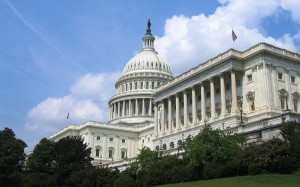 As I explain in U.S. Energy Policy and the Pursuit of Failure, bipartisan compromise is possible and has led to policy change in the past. However, that change has almost always been bad for the country. Bipartisanship has given us ill-conceived and wasteful programs for synthetic fuels, breeder reactors, “super cars,” windmills, and ethanol. The problem runs much deeper than the current President or the balance of parties in Congress. For the past forty years, U.S. energy policy has been premised on false concepts of markets, government, technology, and history.
As I explain in U.S. Energy Policy and the Pursuit of Failure, bipartisan compromise is possible and has led to policy change in the past. However, that change has almost always been bad for the country. Bipartisanship has given us ill-conceived and wasteful programs for synthetic fuels, breeder reactors, “super cars,” windmills, and ethanol. The problem runs much deeper than the current President or the balance of parties in Congress. For the past forty years, U.S. energy policy has been premised on false concepts of markets, government, technology, and history.
The basis for this policy paradigm goes something like this: The 1973-4 oil embargo proved that America was “dangerously” dependent on a world oil market. It was dangerous because we were rapidly running out of oil and natural gas ourselves, and many of the countries that still had oil and gas—namely members of the Organization of Petroleum Exporters (OPEC)—wished us ill. Thus, hostile oil-exporting countries could (and 1973 proved they would) use an oil embargo as a weapon to force us to bend to their wishes. To avoid either a loss of sovereignty or an end to economic prosperity (or both), we had to seek energy independence.
Almost everything about this story is wrong, as markets are clearly better suited to address these challenges than government programs. Fracking has only confirmed that we aren’t running out of domestic supply after all. The gas lines of the 1970s were the result of U.S. policies not the oil embargo. And, however dependent we have been on acquiring foreign oil, OPEC oil producers have been much more dependent on selling it to us. Though there were predictions in 1974 that every oil exporter would make use of the embargo against us, there have been no embargoes because it was a fiasco for the Arab countries who tried it.
Is our desire for energy independence misguided? How might the 114th Congress address energy issues without compounding previous mistakes?
****This discussion is being hosted in conjunction with a panel event to be held on Friday, December 5th at the Hudson Institute. You can find more information on the event and register here.
The problem is not that we will run out of fossil fuels, the problem is that we won’t. The recent IPCC report makes it clear that we must immediately begin… Read more »
You point out that the birth of America’s energy narrative … overcoming a future scarce supply and an overriding concern to recreate the national energy Independence that was ours until… Read more »
Thank you for your comment, but I found much of it very odd. Milton Friedman and his Chicago boys? That was name given to a group of economists who were… Read more »
First, I stand corrected about Jimmy Carter. The roof panels went on during the 2nd oil crisis in 1979 … the one that triggered a 4-5 years recession when oil… Read more »
Jane, You seem to be making two claims at the end of your post. First, that the developing countries are willing to curb their emissions if only we will do… Read more »
To clarify what my final comment meant … I was referring somewhat sarcastically to the argument put forth by Mr. Grossman …. and put forth for years by the anti-regulation… Read more »
You might ask the citizens of Hong Kong about the reliability of PRC promises. Of course, as Lee noted correctly, Xi didn’t really commit to anything that wasn’t happening already… Read more »
I agree with Jane’s comments. The US has put the largest percentage of CO2 into the atmosphere. It stays there for hundreds to thousands of years. China has a higher… Read more »
Regarding the concluding comment in the post about the lack of interest in OPEC in imposing another embargo, note too that the sanctions imposed on the Saddam Hussein regime in… Read more »
About China … I believe they are serious about cutting carbon although I have trouble wrapping my mind around just how huge China is. This year China is on course… Read more »